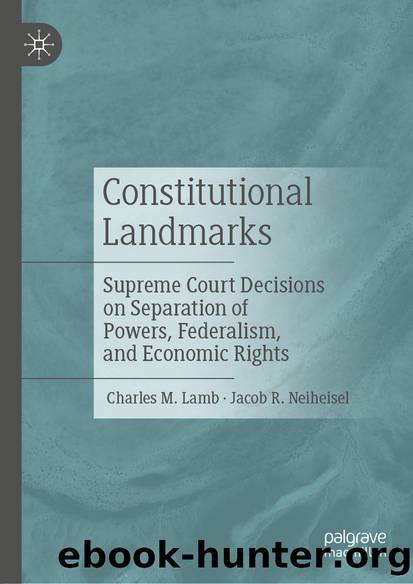Constitutional Landmarks by Charles M. Lamb & Jacob R. Neiheisel

Author:Charles M. Lamb & Jacob R. Neiheisel
Language: eng
Format: epub
ISBN: 9783030555757
Publisher: Springer International Publishing
Schechter Poultry Corporation v. United States, 295 U.S. 495 (1935)
Facts: President Rooseveltâs New Deal Congress passed the National Industrial Recovery Act in 1933. It gave the National Recovery Administration (NRA) the authority to establish codes of fair competition for the nationâs businesses in order to stimulate the economy during the Great Depression. These codes regulated wages, hours, and various trade practices with the objective of eliminating unfair competition. Industries were to formulate their own codes of fair competition, in consultation with the NRA, but the president had to approve them. The president was also given the unprecedented power to impose a code of fair competition on an industry, without the approval of Congress, if an industry did not formulate one for itself. These codes had the effect of law, and Congress established few guidelines to control the kind of codes the president could impose. Aaron, Alex, Joseph, and Martin Schechter owned poultry slaughterhouses in Brooklyn. They were prosecuted under this law and found in violation of various NRA standards in federal district court. The Supreme Court granted certiorari.
Issue: In light of Article I, Section 1, may Congress delegate to the president the essential legislative function of establishing codes of fair competition for American industry, including virtually unfettered discretion to approve the codes developed by industries and to prescribe and impose them as he sees fit in instances in which he rejects the codes an industry develops or where the industry fails to develop codes for itself?
Decision: No
Vote: Unanimous
Majority Opinion: Chief Justice Hughes emphasizes that Congress is given all legislative powers by Article I of the Constitution. Congress cannot abdicate or transfer to another branch of government those essential legislative functions. Whether Congress surrendered or delegated its powers is critical to this case.
The National Industrial Recovery Act does not define fair competition. According to the Act, the chief executiveâs role is to approve the codes of fair competition developed by industries and the NRA based on a finding that those codes would effectuate Congressâs policy as established in Title I of the Act. By contrast, âthe President is authorized to impose such conditions âfor the protection of consumers, competitors, employees, and others, and in furtherance of the public interest, and may provide such exceptions to and exemptions from the provisions of such code, as the President in his discretion deems necessary to effectuate the policy herein declared.ââ
âCongress cannot delegate legislative power to the President to exercise an unfettered discretion to make whatever laws he thinks may be needed or advisable for the rehabilitation and expansion of trade or industry,â Hughes insists. So, does the authority given the president to approve and prescribe codes of fair competition exceed Congressâs authority to delegate power to the chief executive? Hughes thinks it does. He fears that the president is given so much discretion under the Act that he may approve of proposed codes of fair competition as he sees fit. Hughes states some of his concerns: âThe President in approving a code may impose
Download
This site does not store any files on its server. We only index and link to content provided by other sites. Please contact the content providers to delete copyright contents if any and email us, we'll remove relevant links or contents immediately.
| Civil Rights | Discrimination |
| General | Human Rights |
Day by Elie Wiesel(2786)
The Age of Genius by A. C. Grayling(2592)
Gideon's Spies: The Secret History of the Mossad by Gordon Thomas(2355)
The Gulag Archipelago (Vintage Classics) by Aleksandr Solzhenitsyn(2106)
FATWA: Hunted in America by Pamela Geller(2013)
Columbine by Dave Cullen(1870)
Men Explain Things to Me by Rebecca Solnit(1729)
The Rule of Law by Bingham Tom(1701)
Anatomy of Injustice by Raymond Bonner(1671)
Examples & Explanations: Administrative Law by William F. Funk & Richard H. Seamon(1649)
Three Cups of Tea by Greg Mortenson(1620)
The Source by James A. Michener(1619)
That Every Man Be Armed by Stephen P. Halbrook(1584)
ADHD on Trial by Michael Gordon(1581)
Future Design by Unknown(1580)
Gideon's Spies by Gordon Thomas(1512)
Palestinian Walks by Raja Shehadeh(1499)
Constitutional Theory by Carl Schmitt(1458)
Nothing to Envy by Barbara Demick(1451)
